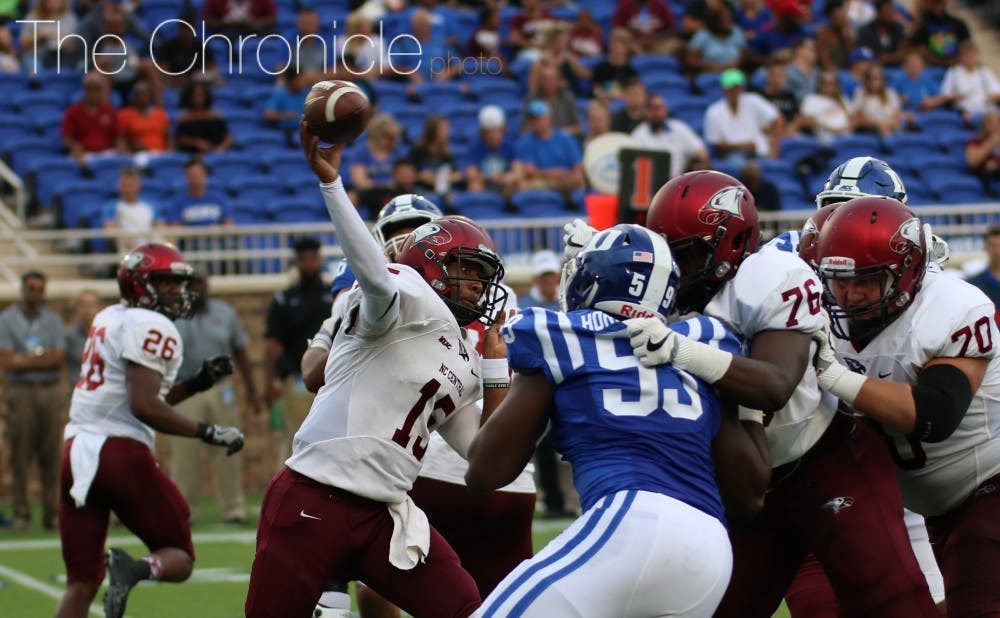The Bull City Gridiron Classic has never been primarily about football.
When Duke and N.C. Central first met in 2009, the city the two universities share was just two years removed from the resolution of the Duke lacrosse case that bitterly divided Durham. The game was a small but symbolic way for two fan bases and schools—the elitist Northern prep school kids against a historically black university located across town—to come together in one stadium. Maybe the game still serves some of that purpose, though the wounds are not as fresh anymore.
I certainly hope it helps in that sense, because from my viewpoint of the teams’ sixth matchup Saturday, it didn’t appear to make either squad better at football.
The Blue Devils have beat the Eagles by at least 35 points all six times and have outscored them 209-13 in four games since 2013. Duke led 47-7 at halftime last week, when most fans were headed to the exits already, and it was impossible to tell how good the Blue Devils were.
Take the passing game, for example, since throwing more deep balls was a point of emphasis in the offseason. Daniel Jones did connect with Aaron Young down the field for a 54-yard touchdown in the first half, but there were no defenders anywhere near Young. It did not have to be a perfect throw, and Young slowed up a few steps to catch it. Would that same play have been executed and completed against a better secondary? I don’t know.
N.C. Central also made things worse for itself throughout the night, hitting rock bottom when it snapped the ball over quarterback Micah Zanders’ head into the end zone to gift Duke two points.
The Blue Devils eventually scored their most points in 68 years by hitting 60 in the second half, when they were waiting for the game to end with their second- and third-stringers on the field.
Last year, Duke was in front 49-0 at halftime, but the success didn’t do much to prepare the Blue Devils for the rest of the year. They turned around the next week and lost at home to Wake Forest.
On-field improvement is admittedly not the only reason to play a football game, and Duke is not alone—most schools play one game like this every year. College athletics is a big business, and these cakewalks help both teams involved make money.
Teams in the top-tier Football Bowl Subdivision, which includes Duke, often pay second-tier teams in the Football Championship Subdivision like the Eagles to come play on their home fields. FCS schools are at a competitive disadvantage with only 63 scholarships allotted for football—FBS teams get 85—and most FCS programs outside the top 10 or so in the rankings are not in the same league as power-conference FBS teams.
FCS teams occasionally pull off shocking upsets—UNLV paid Howard $600,000 to come to Las Vegas and win 43-40 last weekend—but most of the time, they get beat by about 50 and take their lofty paydays back home to support their entire athletic departments. Duke does not disclose details of the contract it has with N.C. Central, but it likely includes a one-time fee as well as some ticket revenue sharing.
In addition to the ticket and concessions revenues FBS teams get from an extra home game, they usually get what amounts to an automatic victory, which gets them one win closer to bowl eligibility. FBS teams need six wins—some exceptions are made for teams with five—to get to a bowl, which means more money, and they are allowed to use one win against an FCS opponent toward that total.
The Blue Devils have one more game on their contract with the Eagles next September before turning their sights to FCS foes North Carolina A&T and Liberty in future years. Duke used to have to worry about FCS opponents in the dark days of the 2000s, losing twice to Richmond, but those future games can all probably be chalked up as easy wins.
Besides Duke, more than 90 of the 130 FBS teams have an FCS opponent on their schedule this year, but it does not have to be that way. The Big Ten has a rule for competitive balance that its teams cannot host FCS schools if they have five home conference games on their schedule, and I think other conferences should follow suit.
Outlawing these games would remove an important revenue stream for small FCS schools. But there has to be a better way for them to make money than the current system, which forces players to get blown out by physically stronger teams once a year for money they will never see.
Get The Chronicle straight to your inbox
Signup for our weekly newsletter. Cancel at any time.

